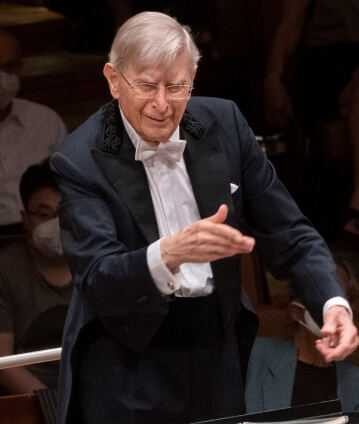Herbert Blomstedt conducts Sibelius and Brahms

“Conducting is a good profession to grow old in, because it’s always a challenge, and you need challenges when you get older”, said Herbert Blomstedt, born in 1927, who is continuing his long-standing collaboration with the Berliner Philharmoniker with undiminished energy and vitality. On this programme Sibelius’s dark, mist-shrouded Fourth Symphony is contrasted with Brahms’s Third.
Johannes Brahms and Jean Sibelius were both not only sparing with their words, but were also of the conviction that programmes should be dispensed with when composing symphonies. Even without extra-musical references, each of their contributions to the genre has a strong individual character. Brahms conducted his F major Symphony himself in a concert of the Berliner Philharmoniker shortly after its premiere in 1884 – according to the archives “from the original manuscript”, since it was not printed until several months later. The character of the work is marked by its shifts between major and minor. The strong contrast between the dramatic impact of the outer movements and the intermezzo character of the middle ones is also what makes the symphony so appealing.
Sibelius’s Fourth Symphony, considered by many to be his most important, is characterised by fragmentary motifs, dissonant harmonies and an underlying tragic mood. While Brahms’s Third fades away quietly, Sibelius’s Fourth breaks off abruptly at the end.
Herbert Blomstedt has been a regular guest with the Berliner Philharmoniker for many years. After unforgettable performances of symphonies by Bruckner, works by Beethoven and the First Symphony by Brahms, among others, he is here with the orchestra for the first time as an interpreter of Sibelius.
© 2021 Berlin Phil Media GmbH
Related interviews
Artists
Our recommendations
- Herbert Blomstedt conducts Beethoven’s “Eroica”
- Bartók and Brahms with Herbert Blomstedt and András Schiff
- Herbert Blomstedt conducts Schubert and Beethoven
- Herbert Blomstedt conducts Bruckner’s Eighth Symphony
- Herbert Blomstedt and Leif Ove Andsnes
- Herbert Blomstedt conducts the “Symphonie fantastique”